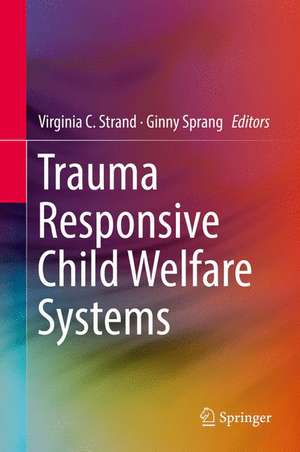Trauma Responsive Child Welfare Systems
Editat de Virginia C. Strand, Ginny Sprangen Limba Engleză Hardback – 6 noi 2017
Among the topics covered:
- Trauma-informed family engagement with resistant clients.
- Introducing evidence-based trauma treatment in preventive services.
- Working with resource parents for trauma-informed foster care.
- Use of implementation science principles in program development for sustainability.
- Trauma informed and secondary traumatic stress informed organizational readiness assessments.
- Caseworker training for trauma practice and building worker resiliency.
| Toate formatele și edițiile | Preț | Express |
|---|---|---|
| Paperback (1) | 643.65 lei 6-8 săpt. | |
| Springer International Publishing – 22 iun 2018 | 643.65 lei 6-8 săpt. | |
| Hardback (1) | 999.10 lei 6-8 săpt. | |
| Springer International Publishing – 6 noi 2017 | 999.10 lei 6-8 săpt. |
Preț: 999.10 lei
Preț vechi: 1218.41 lei
-18% Nou
Puncte Express: 1499
Preț estimativ în valută:
191.18€ • 200.11$ • 159.12£
191.18€ • 200.11$ • 159.12£
Carte tipărită la comandă
Livrare economică 31 martie-14 aprilie
Preluare comenzi: 021 569.72.76
Specificații
ISBN-13: 9783319646015
ISBN-10: 331964601X
Pagini: 349
Ilustrații: XIII, 349 p. 8 illus., 7 illus. in color.
Dimensiuni: 155 x 235 x 27 mm
Greutate: 6.68 kg
Ediția:1st ed. 2018
Editura: Springer International Publishing
Colecția Springer
Locul publicării:Cham, Switzerland
ISBN-10: 331964601X
Pagini: 349
Ilustrații: XIII, 349 p. 8 illus., 7 illus. in color.
Dimensiuni: 155 x 235 x 27 mm
Greutate: 6.68 kg
Ediția:1st ed. 2018
Editura: Springer International Publishing
Colecția Springer
Locul publicării:Cham, Switzerland
Cuprins
Introduction: Developing Trauma Sensitive Child Welfare Systems.- Applying Trauma Theory to Agency Practice.- Applying Trauma Theory to Organizational Culture.- The Role of Cultural Competence in Trauma Informed Agencies and Services.- Trauma Informed Family Engagement with Resistant Clients.- System Change Designed to Increase Safety and Stabilization for Traumatized Children and Families: Trauma Systems Therapy.- Use of a Standardized Assessment Tool within Child Welfare: Applications of the Child and Adolescent Needs and Strengths-Trauma Comprehensive (CANS-Trauma).- Partners in Child Protection: A Trauma-Informed Approach to Assessment in Child Welfare.- Introducing Evidence-based Trauma Treatment in Preventive Services: Child-Parent Psychotherapy.- Working with Resource Parents for Trauma-Informed Foster Care.- Addressing Birth Parent Trauma – Pathway to Reunification.- A Trauma Informed Model for Supporting Pre-Adoptive Placements.- Using Implementation Science Principles toSustain Trauma Informed Innovations in Program Development.- The Tale of Two Counties United by Pursuit of the Best Interest of Children through Trauma Informed Practice.- Trauma Informed Organizational Readiness Assessment.- Organizational Assessment of Secondary Traumatic Stress: Utilizing the Secondary Traumatic Stress Informed Organizational Assessment Tool to Facilitate Organizational Learning and Change.- Trauma-Informed Strategies for Staff Recruitment and Selection in Public Child Welfare.- Training the Child Welfare Workforce on Trauma-Informed Principles and Practices.- Indirect Trauma Sensitive Supervision in Child Welfare.- Trauma-Informed Professional Development.- Summary and a Vision for the Future.
Notă biografică
Virginia C. Strand, DSW, is Professor and Founding Director of Children FIRST, a research and training institute within the Fordham University Graduate School of Social Service. Her research interests are in child welfare and children’s mental health and she has published most recently in the areas trauma assessment for children and transfer of learning programs for child welfare workforce development. Currently, she is PI representing Fordham on a new federal institutive, the National Child Welfare Workforce Institute.
Ginny Sprang, PhD, is a Professor in the College of Medicine, Department of Psychiatry, at the University of Kentucky. Dr. Sprang is a Principal Investigator and Executive Director of the Center on Trauma and Children at the University of Kentucky. She has served as a member of the National Steering Committee of the National Child Traumatic Stress Network (NCTSN) , is the current Co-Chair of the Secondary Traumatic Stress Committee, and is the Chairof the Terrorism and Disaster Special Interest Group of the International Society for Traumatic Stress Studies. Her scholarship focuses on the clinical, forensic, and empirical aspects of traumatic stress and the efficacy and effectiveness of treatments to address the biopsychosocial impact of violence against children. Dr. Sprang has published extensively in the leading journals focusing on trauma, maltreatment, and treatment efficacy in adults and children.
Textul de pe ultima copertă
This comprehensive reference offers a robust framework for introducing and sustaining trauma-responsive services and culture in child welfare systems. Organized around concepts of safety, permanency, and well-being, chapters describe innovations in child protection, violence prevention, foster care, and adoption services to reduce immediate effects of trauma on children and improve long-term development and maturation. Foundations and interventions for practice include collaborations with families and community entities, cultural competency, trauma-responsive assessment and treatment, promoting trauma-informed parenting, and, when appropriate, working toward reunification of families. The book’s chapters on agency culture also address staffing, supervisory, and training issues, planning and implementation, and developing a competent, committed, and sturdy workforce.
Among the topics covered:
Among the topics covered:
- Trauma-informed family engagement with resistant clients.
- Introducing evidence-based trauma treatment in preventive services.
- Working with resource parents for trauma-informed foster care.
- Use of implementation science principles in program development for sustainability.
- Trauma informed and secondary traumatic stress informed organizational readiness assessments.
- Caseworker training for trauma practice and building worker resiliency.
Caracteristici
Offers a robust framework for introducing and sustaining trauma-responsive services and culture in child welfare systems Targets psychology professionals, social workers, and mental health professionals applying trauma theory and trauma-informed family engagement to clinical practice Addresses the staffing, training, planning and implementation necessary to develop a competent and committed workforce Focuses on concepts of safety, permanency, and well-being Explores innovations in child protection, violence prevention, foster care, and adoption services
